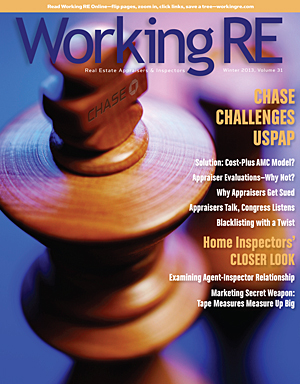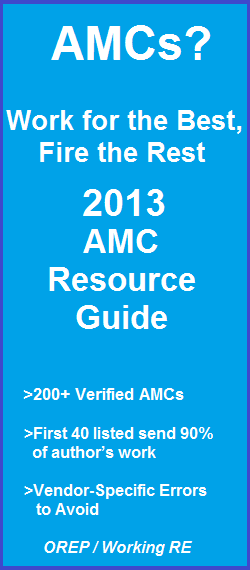
|
Published by OREP, E&O Insurance Experts | Feb. 13, 2013 | Vol. 271 |
"Lawsuits
can be divided between those you cannot control and those that you can. Here’s
what you need to know about each."
Thursday Expert's Webinar: Time Management: Organizing Your Appraisal Office to Work Smarter not Harder
Editor's Note: Author Phil Spool, ASA, represents appraisers, errors & omissions (E&O) insurance companies, and lenders as an expert witness for the prosecution as well as for the defense. In this story, he shares the reason why appraisers get sued.
Why Appraisers Get Sued
by Philip G Spool, ASA
Lawsuits can be divided between those you cannot control and those that you can.
Here’s what you need to know about each.
Lawsuits that you cannot control are typically pursued by plaintiffs
(filing the lawsuit) who are dissatisfied with your value more than any mistake
you might have made. Even if you have taken precautionary measures to
reduce your chances of being sued, in the mind of the dissatisfied person, there
is good reason to sue you. Even a “correct” value doesn’t protect you.
Anyone can sue you for just about any reason.
A lawsuit doesn’t have to originate from the lender, Fannie Mae, FDIC or any
other purchaser of the loan associated with the property you appraised. You can
be sued by the buyer if you appraise the property for less than the contract
price, especially if the borrower now has to put up additional money for the
down payment. The seller might want to sue you if the real estate transaction
falls through because as real estate agents typically say, “the property did not
appraise” or “the appraiser did not come up to value.” Sound familiar? The
buyer may have to put up additional money, or if the sale falls though, the
seller does not get to sell the house and the real estate agent loses a
commission. Who is the first to get blamed? Of course it’s the appraiser.
It’s easy to blame the appraiser. Again, this is a situation that most likely is
out of your control.
Another situation that is out of your control is fraud committed by the mortgage
broker. In this case, there is a good chance that the lender would have a
“blanket” lawsuit suing everyone involved in the loan. This includes the
mortgage broker, “straw” buyer, seller, real estate agent representing the
buyer, title company and the appraiser. It might be only one person or
several who are in on the fraud but everyone might be implicated. You may be
implicated if the appraisal request states: “estimated market value of $...” or
“call me if the value is less than $...” or something similar. Not only is it a
violation of USPAP, either one of those two statements gives the appearance of
your collusion with the mortgage broker.
Why Appraisers Get Sued
Having a complaint filed against you by your state appraisal board is bad
enough; being sued by the lender, Fannie Mae or other purchaser of the loan,
however, can seriously affect your livelihood as well as your pocketbook. The
number-one reason why a lender might sue you is if the borrower defaults on the
loan. If the loan goes into default, the lender or GSE might hire an
appraiser to perform a “retrospective” valuation of the subject property without
going inside the house, with the date of the valuation being the effective date
of your appraisal. It’s ironic, isn’t it, that the lender typically
doesn’t hire a review appraiser when the loan is made but is eager to do so
after the loan is in default.
Fraud, Incompetence & Bad Appraising
Intentional or Unintentional - Oops!
What to do When Notified of Potential Lawsuit
So what do you do first when you receive notification of a lawsuit? First,
save all correspondence. Do not reply back immediately. Start a
paper trail by recording in a journal any phone calls or letters you receive
regarding the potential lawsuit, including the date, time and who you spoke to.
Second, look for your workfile on the appraisal in question. If you are
diligent in keeping records, you would have arranged your workfile so that all
correspondence is in the beginning of the file, followed by the appraisal report
(a true copy of the report you sent to your client), followed by your selected
comparable sales, analysis performed and supportive data that relates to
findings indicated in your appraisal report, including land sales and/or market
extraction for the site value, replacement cost, new cost figures and finally
any other data that you considered but did not use (other improved sales and
rental information if the property is two units or more).
Board Complaints
Can Insurance Company Settle?
Past Reasons for Getting Sued
Another instance is using developer sales and ignoring re-sales or sales outside
of the development. An appraiser who uses developer sales but fails to
find out the date of the contract can cause an overinflated value in a declining
market. Many developments were under construction in 2005-2007. The
peak of the market was probably sometime between 2005 and 2006. If you
were appraising a unit in 2007 through 2009 and the developer’s sales were the
only sales in the development, did you get a copy of the contract that showed
the date the contract was entered into? If the contract date was in 2005,
there is a good possibility that the market had declined by the time the
property closed, which may have been sometime between 2007 and 2009.
Therefore, that sale would have reflected a sales price much higher than if the
unit was put on the market close to the time you performed your appraisal.
Current Reasons for Getting Sued
Liability for Bad MLS Data
Should You Retain Workfiles Longer than Five Years?
In conclusion, no matter how good you think your appraisal report is, there is
always that possibility of being sued. While it may never happen, it is
always good to have a plan of action just in case. If you have E&O
insurance, contact your insurance company and see if you can request the
attorney of your choice, depending on the situation. Keep a cool head and
make sure you have a good support group.
About the Author
I recently taught a continuing education class on mortgage fraud. I
conducted a survey as to why appraisers think they get sued and who they believe
sues them. The results of the survey, as to why appraisers think they get sued,
in descending order are: (1) value issue, (2) loan goes into default, (3)
appraiser has E&O insurance, (4) mistake in the appraisal report, (5) falsified
information in the report and (6) using non-MLS comparables that were not
verifiable. The results of the survey as to who appraisers think sues
them, in descending order are: (1) buyer or seller, (2) lender or the GSE
(government sponsored enterprises such as Fannie Mae, Freddie Mac, FHA or VA)
and (3) spouse in a divorce case. Well, the fact is that appraisers get sued for
all of these reasons. In any of these
cases, your only defense is a supportable appraisal report. A bad appraisal
report is not supportable. A good appraisal report that has good comparable
sales, reasonable adjustments and a good text addendum that explains the
important aspects of your findings and conclusions is considered supportable.
What constitutes a valid reason to sue? One is fraud. What
constitutes fraud? Fraud occurs if you falsify your comparable sales or
intentionally ignore an attribute that the comparable may have that your subject
does not have or vice versa. A good example is if the comparable is on a lake or
golf course but you ignore that and your subject is not on a lake or golf
course. If you claim that your failure to indicate that your comp is on a
lake or golf course is a “mistake,” your mistake still misleads your client and
that is a valid reason to be sued, especially if you failed to make an
adjustment for the view difference or if the waterfront or golf course property
would appeal to an entirely different type of buyer than a house not on a lake
or golf course. But fraud is hard to prove and most likely a lender will
not sue you for fraud. A good reason is that your E&O insurance coverage
excludes fraud.
Instead of your appraisal being considered fraud, the report might be considered
just a bad appraisal due to incompetence if it violates Standards Rule 1-1 (a)
and/or (c). Standards Rule 1-1 (a) states that the appraiser must
correctly employ those recognized methods and techniques that are necessary to
produce a credible appraisal. Standards Rule 1-1 (c) states that a series
of errors, in the aggregate, affects the credibility of those results.
Read up on appraisal theory and proper appraisal techniques. Take classes
that relate to the sales comparison and cost approaches. You may have
initially taken an accelerated appraisal course in order to obtain your trainee
license and then were taught poorly or in too short a time to know the proper
way of making adjustments or determining if the subject is an over improvement
or at its highest and best use.
Notification of a potential lawsuit might begin with a phone call or certified
letter that puts you on notice of a potential lawsuit. It may be a form
letter with generalities only, such as the property address. Or it may be
specific, indicating that the value you indicated in your appraisal report is in
question or your selection of comparable sales. No matter what the
situation is, if you have E&O insurance, notify the company right away once you
get official notification that you are going to be sued. I don’t believe
that an angry phone call to you, even coupled with a threat, is sufficient to
notify your E&O insurance company or for that matter, to engage an attorney to
represent you.
Once you retrieve your workfile, contact your E&O company. If you don’t
have errors and omissions insurance, consider retaining an attorney on your own
to represent you. Some attorneys don’t charge for the initial
consultation, others might charge a flat fee to represent you while others
charge an hourly fee with an initial retainer to start correspondence.
For a complaint filed against you by your state
appraisal board, get an attorney who is very familiar with administrative law.
For a lawsuit, get an attorney who is a good litigator. Having a good
litigator representing you is more important than his/her familiarity with real
estate law. Also, have the attorney obtain an appraiser expert witness who
teaches appraisal courses, is knowledgeable about USPAP and has courtroom
experience. An expert witness who is knowledgeable about USPAP, such as an
AQB-certified USPAP instructor, but has little or no courtroom and/or classroom
experience, would not be an effective expert witness. Why is classroom
teaching experience important? Your expert witness has to educate the “trier of
fact,” whether it is a jury or judge. If your expert witness is unable to
explain the appraisal process, scope of work and how you did your research and
applied appropriate methods and techniques in preparing your appraisal report,
and the opposing expert witness is better at convincing the trier of fact,
then no matter how correct your report is, your case becomes ineffective.
During the course of discovery and depositions, the E&O company has the right to
settle even if you strongly believe you have done nothing wrong. Check
with your E&O company to see if they have consent to settle provision in
your policy. This is neither an admission of liability nor an admission of wrong
doing.
Most lawsuits by lenders based on appraisals prior to 2010 involved a property
in a declining market. One potential reason for a lawsuit is that an
appraiser failed to make a negative time adjustment when there was a declining
market (for most areas this was between 2007 and 2010). Sometimes the
lender sues if you stated that the property values were “stable” when the One
Unit Housing Trends area should have been checked “declining.” A good
response to that charge is that when the appraisal was performed, evidence of a
decline in value could not have been supported and was not conclusive until many
months later.
Appraisers for lending institutions follow three guidelines: (1) USPAP; (2)
Fannie Mae - if the report is on a Fannie Mae form; and (3) lender or AMC
guidelines. The lender might restrict the appraiser to using only sales
within one mile and within three to six months. This limits comparable
sales that could be more similar to the subject, even if in a substitute
neighborhood but further than one mile. Or a sale could be older than six
months and be more comparable to the subject than those sales that are less than
six months. Consider using additional sales that support your value even
if they are outside of the lender’s restrictions, in addition to those within
the lender’s guidelines. If the sales support a lower or higher value on
comparables that you truly believe are better comps than the only ones allowed
by your lender’s restriction, use them and give them a greater, weighted average
for your concluded market value.
How many times have you found mistakes in the Multiple Listing Service (MLS)
and if it weren’t for the fact that you verified that sale, which means picking
up the phone and calling the listing agent, you would not have known there was a
mistake. This includes sales concessions indicated in the MLS. Some
questions to consider include what are the requirements for relying on third
party information versus the real estate agents, buyers and sellers, who have a
vested interest in the property? No matter who you rely on, Standards Rule
1-1 (b) under the comments section states, “Diligence is required to identify
and analyze the factors, conditions, data, and other information that would have
a significant effect on the credibility of the assignment results.” Do you
have evidence in your workfile regarding the verification of information you
relied on? Perhaps you might want to consider making a statement in your
appraisal report that you relied on the information from these reliable sources
and if found to be incorrect, may affect your market value.
USPAP states that “an appraiser must retain the workfile for a period of at
least five years after preparation or at least two years after final deposition
of any judicial proceeding in which the appraiser provided testimony related to
the assignment, whichever period expires last.” Rather than throwing out
your file after five years, consider the possibility of having it scanned and
saved in an external hard drive. It won’t take up office space and in case
you are notified of a potential lawsuit, even if it is after five years, at
least you have the necessary backup data to support your value conclusion.
Philip G. Spool, ASA, is a State-Certified General Real Estate Appraiser in
Florida, appraising since 1973. Formerly the Chief Appraiser of Flagler
Federal Savings and Loan Association, he has been self-employed for the past 19
years. In addition to appraising, he is an instructor with Miami Dade
College, teaching appraisal courses and continuing education. He is also
the Vice President and Chairman of real estate programs with the Greater Miami
Chapter of the American Society of Appraisers. He can be reached at
pgspool@bellsouth.net.
>
ATTENTION: You are receiving WRE Online News because you opted in at WorkingRE.com or purchased E&O insurance from OREP. WRE Online News Edition provides news-oriented content twice a month. The content for WRE Special Offer Editions is provided by paid sponsors. If you no longer wish to receive these emails from Working RE, please use the link found at the bottom of this newsletter to be removed from our mailing list.




